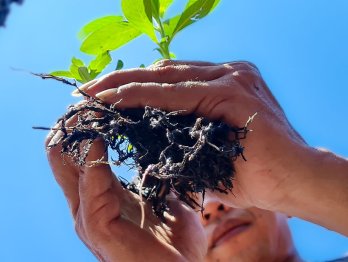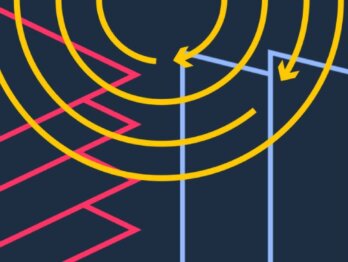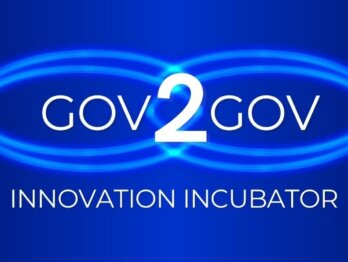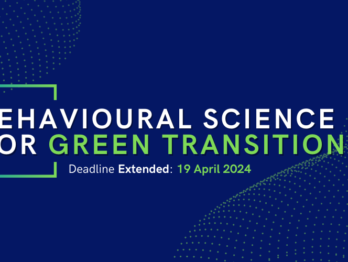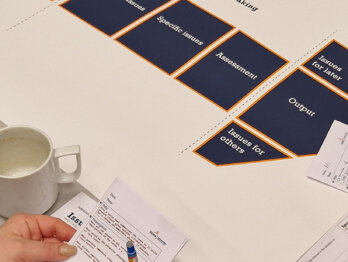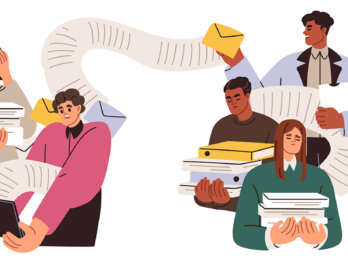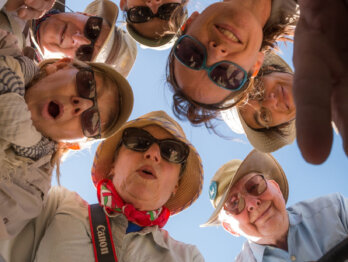“We’re not going to go back to normal” – Insights from the #GovAfterShock interviews

In the lead up to Government After Shock we undertook a number of interviews with a range of leaders and practitioners to hear about perspectives on the COVID-19 pandemic and what the associated crisis was revealing. The culminating event of Government After Shock was part of our collaboration with the European Commission through the H2020 programme, and these interviews helped provide us with a richer understanding of how innovation works in practice, with the crisis acting to illustrate and magnify the elements of the innovation process. In this blog post I want to share some of the things that stood out to me and that I think are relevant to the general Government After Shock conversation as we now work to develop the Call to Action coming out of the events. (Note: this is a longer post than usual, but I hope it will be of interest to some and is part of an attempt to ‘show our workings’ as we piece together the Call to Action).
“When I think back to government before COVID, do you think any of us would have ever moved policy as fast as we have in the last few months? Or would we have ever expected whole of government agencies to be able to work from home?” Jemma Greene
Experiences and observations
The contexts of the different interviewees varied greatly, from health systems to ministers and ministries, from local government to international bodies, from libraries and museums to government communities, from within the public sector and to those who work closely with the public sector. Yet there were common threads and similar concerns or observations.
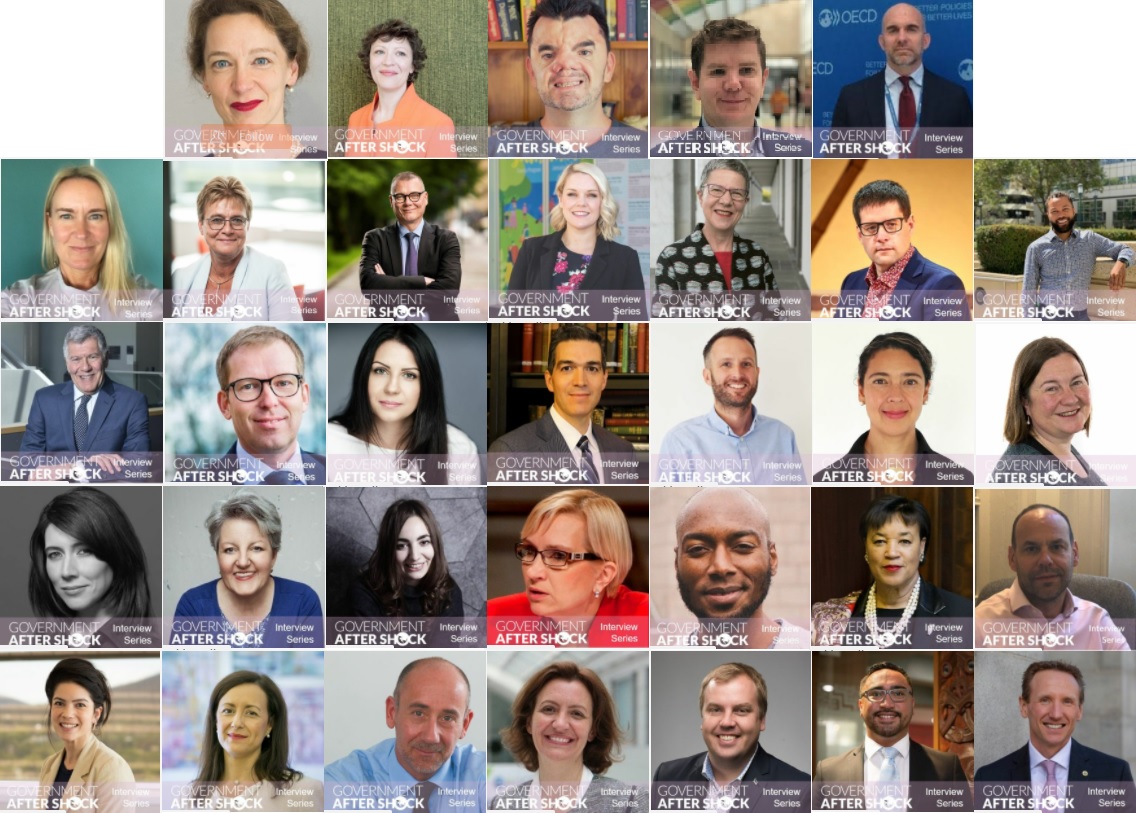
As for many of us, interviewees shared that the crisis had been sometimes very difficult and challenging (as well as “mad”), but Misha Kaur perhaps put it best for me when she said it had been “everything from interesting to testing, to exciting to draining, to surprising to flat, it’s had all parts of the spectrum”. While a terrible thing to have happen, the pandemic has also been a very different time that has professionally been both a challenge and an opportunity.
“And so it’s been literally exciting and terrifying all at the same time to respond with so much agility, and better yet, with the understanding that there is an amount of risk and an amount of failure that we’re just comfortable with that if something isn’t working, I can cut it off immediately and say we’re pivoting, doesn’t matter, kill it, it’s done.” Warren Logan
The peak of the crisis meant that there was no time for traditional bureaucratic elements, and a need for more agile methods and management, that could respond at the pace demanded in response to the spread and ferocity of the coronavirus. Risks that were previously unthinkable suddenly became accepted as part of the necessary cost of operating in an uncertain environment. The crisis also meant that different connections and relationships were possible, as everyone was united in the need to get things done and work to address the pandemic. Government could and did work in different ways with civil society and with the private sector, often to great effect.
“The benefit of the pandemic was that everybody wanted to be involved and feel they were doing something meaningful. So definitely, the doors were open more for us to actually connect and talk to people.” Jemma Greene
This openness was also felt to apply internationally, with easier connections across borders as everyone accepted that the crisis was international, with different contexts but similar issues, concerns and needs. This often led to more international conversations and sharing than occurs normally.
“I think that this is so big, that no country alone, or no sector alone can solve this.” Juhani Damski
There was a general recognition that these exceptional times had asked and required exceptional responses from people, and people rose to the challenge.
“… it is astonishing, the mindset, the capability, the leadership, that really many people have undertaken over the last six months, whilst responding to something that none of us have ever responded to before.” Dominic Campbell
This was especially true in terms of digital transformation and adoption of digital tools, methods and services.
“And digital services were developed and rolled out in just a few weeks instead of years. So in that way, we all became digitally mature in superspeed. We took giant steps into this digital world and and saved years of slow development.” Petra Nilsson Andersen
This does not mean that the responses by governments were always or particularly easy, but that there was a common thread about how the crisis reminded us all of the vital roles that government plays. When the purpose of the public sector has shone through so brightly and clearly, and people have been really connected with their work, then it has been easier to achieve impressive things.
“I think we’re all feeling that this is kind of one of those moments where the public service really matters. Whether that’s at the national level or sub national or city level, all public servants are kind of doing their best to support citizens.” Jason Pearman
Despite the sometimes impressive achievements of the public sector, there was a real sense from many that the pandemic had been a test of some deep system elements, and that now is a time to revisit or fundamentally ask some big questions about the status quo. The crisis has shown us that different things are possible and while the pull of the prior normal will be powerful, there is an opportunity to seize new opportunities if we are brave enough to try.
Revelations
We asked each of the interviewees what the crisis had either highlighted or revealed for them or made them question/challenge their assumptions. While I won’t go through all of them (there were quite a lot!), I’d like to mention some in particular.
“… one of the greatest lessons learned is the strength, the need for a strong public sector, strong institutions, the need for strong bureaucracy.” Chad Hartnell
- First, it had revealed that most governments have proven that they can consider act and collaborate very quickly, navigating difficult decisions and making resources available at a great speed – when they choose to or are forced to.
- Second, there was incredible speed in using/taking-up technology, implementation of some long awaited innovations that had been started but not scaled over previous years.
- Third, the crisis has emphasised the importance of trust for government – not only from a utilitarian perspective of helping ensure compliance and buy-in from citizens, but in giving governments the room to experiment and try new things.
- Fourth, the crisis has demonstrated both the essential nature of government as a deliverer of support in emergency situations, and that government needs rich and deep networks of connection in places and localities – it cannot just run everything from from a head office/centralised perspective and expect to be effective in dealing with nuanced contexts.
- Fifth, it has shown the need to invest heavily in the capacity of government. This is not about governments being big or small, but rather the capacity of governments to be fully effective in shaping tomorrow’s societies, in part through anticipatory innovation, and helping ensure there is resilience.
- Sixth, it has demonstrated the importance of a participatory model to pass through a crisis. “… we need to talk to each other, we need to have consultations, we need to react together.”
- Seventh, that a digital world requires different types of engagement and communication.
- Eighth, the crisis has dramatically highlighted the Anthropocene era, namely the period when the Homo Sapiens species is having an enormous impact on the planet’s natural systems and its ecology.
- Ninth, it has emphasised the value and importance of science and the scientific method.
- Tenth, the combination of the crisis and the digital transformation accompanying it emphasises the importance of the human factor in all our activities. Good public governance is about people, citizens, public servants and and other stakeholders: that work is about people. And governments have shown that they can respond with creativity and compassion.
In regard to this last point about ‘humanness’ there were a range of points raised about what that might signify, but one that resonated for me (not least because of the excessive amounts of television I devoured during lockdowns) was about the role of art.
“The pandemic has shown that arts is critical to our life. Certainly when it first started, what were we doing? We were all watching concerts on Facebook. We were watching the Metropolitan do their you know, fantastic gala, and they had opera singers around the world… However, why isn’t the arts always at the decision making table?” Rosemary Thompson
Thus some of the points raised by interviewees helped to highlight questions of whether the current focus of our systems is really aligned with what we need or want as a collective, and the extent to which we are really engaging with and listening to a wide enough mix of people and perspectives. Who do we involve, how do we involve them and how do we account for people as whole people as opposed to representations?
“I think the thing I would like to keep and indeed accelerate is that sense that this is something that can only be responded to, in a in a communal way, you know, by people as a whole.” Anthony Zacharzewski
Yet a greater focus on the ‘human’ side is also to embrace the messy, complex and blurred lines that come from really understanding and engaging with people as a whole, rather than taking a functional, siloed or segmented approach. This crisis, perhaps more than any others in recent memory, has dramatically illustrated the interconnected nature of our world. Yet there remains a very big question about whether our systems are built for this understanding or can sustain a long-term, systemic approach to long-term systemic issues.
“It’s the fact that all of these crises, whether it’s income inequality, systemic racism, climate change, we always knew they were interconnected, and many of us that kind of have been saying that, you know, we need to bring some systemic solutions to systemic problems. We all kind of understood that, theoretically. But now we’re seeing it. And if there was any doubt that these things are interconnected, it’s absolutely clear. And for those of us that kind of bought into those narratives were like holy smokes, like they really are interconnected. And you can’t just work on one without also trying to tackle the other… so again, do we have the institutional capabilities to shift systems to really go after significant improvement in outcomes? Can our organisations and our institutions keep up with the pace of change? And importantly, can we reimagine how our institutions have helped societies navigate through challenging times?” Jason Pearman
Leaving behind, keeping and doing differently
Each of the interviewees was asked the core Government After Shock questions – what do we need to leave behind, what do we want to keep, and what should we do differently? Again, there were a lot of different thoughts so I won’t go through all of them here, but I think there were some important things raised that are worth pulling out.
Leaving behind
Some of the points about what we should leave behind given what has been revealed by the crisis included:
- Complacency. There has been too much faith in technology as the solution for everything and a self reassuring belief that our current systems are future proof (capable of facing uncertainty, complexity and the unexpected). The crisis has shown that the idea of progress as a clear, linear upward trend for societies is not true, and that we can be very fragile, that humanity and progress can actually go backwards.
- Consumption. The crisis has highlighted that the consumer and travel patterns of 2019 are both unsustainable but also not entirely necessary. The crisis has given us pause and opportunity to think about what we really need, and to question the idea that “we and nature are not locked-in together in one future”.
- Concentration of power. The crisis has shown that effective action requires action and decisions across the system to deal with different contexts, and the solidarity demonstrated has shown that different actors can contribute in a range of ways if only asked and empowered. Social inequalities weaken our ability to collectively address collective, interconnected problems, where the health of one can affect the health of many.
- Conventional assumptions. We need to leave behind some of the dated attitudes that we have about the conventions of workplace, where we work, and how we expect people to work.
- Closed vision. We need to give up the ‘not invented here syndrome’ as the COVID-19 crisis has shown that learning from each other is essential. We need to give up a lack of, or a lack of attention to, foresight and anticipation.
What to keep
What do we want to hold on to from during the crisis, or what from before the crisis have we been reminded of as being precious to us and needing to be sustained as we look to the future?
- Impact. We need to keep a more sophisticated understanding of impact and what kind of effects the work we (the public sector) do has on people and the community.
- Pacing. Slowing down and taking the opportunity to think about what we’re working towards and not being in a hurry to be the first ones to do something.
- Solidarity. A sense of being connected and of solidarity, and awareness of our interconnectedness and interdependency.
- Experimentation. Experimental mindsets, a willingness to change, and fast iterative approaches, building policies, testing, capturing signals, engaging with and delivering and implementing policies rather than assuming that the responses are already there.
- Cooperation and collaboration. The cooperation between different parts of the system seen during the crisis, and the willingness to open up to and engage with others from across sectors and countries.
- Communication. Ongoing agile communication with the public, and a focus on high value, nutritious communications, rather than the tendency towards tasty, high calorie, low vitamin communication that is just about meaningless engagement and numbers for the sake of numbers.
- Science. Respect for scientific understanding and and using science based facts for making decisions.
- Professionalism. The professionalism seen by the public sector in a very difficult crisis, led by passionate people (rather than seeing public servants as bureaucratic “grey blobs”), who are capable of creativity, innovation and caring.
- Urgency. We should have a sense of urgency for dealing with some of these other systemic challenges, such as inequality, systemic racism, and the climate crisis.
What to do differently
What should we be aiming to do differently given what we know now? Some of the points raised included:
- Interaction and participation. Finding a good balance between digital and in-person meetings and interactions, and creating an open and secure digital infrastructure for participation that is inclusive.
- Beyond binaries. We need leadership that is capable of moving beyond simple binaries, and that recognises the complexity of the modern world and leads a response that is truly multidisciplinary and multisectoral in its in its nature. We need to destabilise the discourse of disagreement, and push towards actionable civic engagement.
- Innovation. Understand and appreciate that innovation is really critical to the work, effectiveness and success of the public sector, and to work out what it is about burning platform that gives us that motivation and drive to do act at scale and pace, so that we can create that as something that we can that we can keep and sustain.
- Anticipatory. Being more anticipatory in the way we look to the future and prepare for different possible futures.
- Sustainable development. Work out how to do and develop things in a way that they don’t do any harm to the environment, or climate or biodiversity.
Thoughts about what needs to come next
There was a common sense that things could and should change, but just because there is the opportunity and the need, it does not mean that change will follow.
“But when it comes to actually doing things differently, none of us want to be the ones to let go of certain parts of ourselves to be able to actually do things differently.” Misha Kaur
In part, this is about recognising that there are downsides to change, and that while there were many things from the pre-COVID-19 world that we might wish to leave behind and that the crisis has helped us see as not working, that does not mean it will always be easy to leave behind.
“I’m in a form of mourning, in some respects, both on a personal and corporate level, in the fact that, you know, it isn’t going to be the same.” Dominic Campbell
There is also the factor that change is easy when reacting to a sudden crisis that demands change and where existing measures and practices have to be abandoned at short notice and where everyone, at all levels and within and without the bureaucracy, has shared sense of purpose or common understanding of the need for change. As the crisis evolves and, hopefully, eases, the answer to what is needed becomes less clear and with less agreement, what will be easy to leave, keep or do differently will depend a lot upon the emergent vision of change and the extent to which it has broad support.
“So it’s a bit of a yes, we want to build back better. But then when the rubber meets the road to implement choosing and implementing policies and programs to do that, it’s a bit murky about what that means. Now, part of that is a bit of a political question. But part of it is just the lack of vision, either at the political level or at a societal level about what we what we want.” Lisa Witter
Some raised the need for the decisions being made to have an eye to the future, that the investments made to recover from the crisis should steer us towards a better future, but again, this is greatly influenced by thoughts and values regarding what that future should be.
“… a lot of us in the public innovation world are trying to support decision makers to not only think about how to respond to the challenge … we’re also trying to think about how do you invest in the future?” Jason Pearman
This need for vision or a sense of what we are collectively working towards (or should be working towards) becomes more important when the crisis is seen in a broader context. The shock of the pandemic and its effects on the world, the connection with other crises and long-standing or deep-seated concerns, emphasised for some that this moment in time is a real turning point.
“I think it’s confirmed certain things, in terms of what it’s really made me understand, we have no time. This existential threat is real. It’s now. The fact that we’re dealing with this pandemic, but it may not be the last pandemic, and these shocks are going to come. It’s made me really ask the question: if we’re not going to make the changes, we need, we need now, when we are facing this multiplicity of difficulties, then when and if not us, then who? I think it has really emphasized the generational challenge that we face, this is a pivot point, a real pivot point.” Patricia Scotland
In which direction however, shall we, should we or will we turn?
At the same time, there should be a necessary caution about thinking that the crisis necessitates getting rid of everything that came before.
“I think there’s a slight movement at the moment of almost trashing everything that’s gone before. And we’ve got to be new and different. There’s a huge amount that was brilliant and positive and wonderful, about a pre pandemic world.” Dominic Campbell
The question then becomes how do we collectively work out what fits into the category of leaving behind, keeping, and doing differently. In the absence of an overarching and agreed vision or paradigm for change, and that helps guide and illustrate what is relevant and what is not, then this task will likely be very difficult.
The most visible crisis but not the only crisis
The pandemic took over the discourse of 2020, leaving little room for anything else, but that does not mean that it was the only crisis. Many interviewees linked or saw direct connections between the pandemic and other crises, whether it be fires in Australia, floods in Wales, the Black Lives Matter protests, protests against police brutality, inequality and economic insecurity, gender based violence, access to health services, and many more. Many of these other crises or issues were themselves exacerbated by the crisis.
And some of the crises that we might have thought were on their way to becoming better can sometimes return and that while change can sometimes be very quick it can also be very slow.
“I think many of us were actually heartbroken by the Black Lives Matter reality, because so many of us thought that our world had come so far forward. And it was a shock to recognise that it hadn’t come as far as we hoped.” Patricia Scotland
This raises the question to what extent the change seen during the crisis will be sustained as and when the crisis evolves and eases. One difference of this crisis might be its sustained nature which has required continual change in practices and routines and so there are some things that we may have, both individually and collectively, habituated to.
“The difference this time for me is really that it’s such a sustained period, that there is a chance that we can change culture, because culture is really just a set of behaviors and norms that everyone’s become used to. And given the long term nature of this particular crisis, I think that I have some real confidence that we have started a change in culture.” Simon Claydon
There is also a question of whether we can learn from this time, learn from this experience of a very visible and tangible emergency, and apply it to longer-term, slower moving and often less tangible, visible but no less urgent crises.
“We do now know what an emergency feels like. And we know what an emergency response feels like. And that can be quite difficult at times, it can be very challenging. It can sometimes feel a bit clunky. But it’s very quick and it happens, things change. And I think that probably we were all thinking, oh well, climate and environment emergency. And we need to, you know, push them and all the rest of it. But were we really reacting, behaving as if it was an emergency? Well, I think knowing what we now know, the answer has to be no.” Claire Pillman
And thus perhaps one of the biggest challenges of the crisis is whether we can respond to it by taking a more long-term view, one that maintains a clear sense of purpose for long-term issues, while also dealing with the day-to-day issues, surprises and crises that emerge.
“But we also need to prepare for the long emergency, not like the thing that, you know, we’re going to have to deal with this week. But the things that our countries will have to deal with year one, year two, year three of post shock, and I don’t think we feel like our institutions have the capacity to think and act over the long term. And, and that’s giving us pause.” Jason Pearman
Such long-termism will also need to be combined with multilateral efforts, as the crisis has shown the fiscal, social and environmental interdependence of nations and that a pandemic takes a global response. Yet there are fair questions as to whether our multilateral structures are adequate and suited to the tasks that might be asked of them. And so, the need for change is not just for governments at the local, state and national level, but also in how they collaborate with each other.
“…[the] Bretton Woods multilateral architecture was great for a period. We need to retain our multilateral approach, but we need a new architecture, which will be capable of delivering that which is needed for the 21st, 22nd century.” Katju Hokeri
While these conversations were not focused on the work of the OECD, nonetheless, a common sentiment was the important role that international fora can play in helping not only share experiences and lessons across countries, but also to provide direction and guidance for nation states.
“… you need to give a direction to public policies. And this direction has traditionally been competitiveness, productivity remains relevant and important, but I think the direction which we need to give to our public societies are around these green and digital transformations.” Jean-Eric Paquet
Concluding thoughts
While there was a lot discussed in the different interviews, there was, on the whole, a strong note of optimism throughout the interviews. While the crisis has been difficult and terrible, there have also been bright spots and it has taught us much about ourselves, our systems and our societies. Most importantly it has shown us that while we need to change, change is very possible – we just need to choose it.
“We can do this. We just have to do it together. And we have to have the courage to choose inter-dependence, as opposed to isolation. And we will, and we will. So it is our time, and we can do this.” Patricia Scotland
You can listen to any of the interviews through our Soundcloud or your preferred podcast apps – a big thank you to all of the interviewees. This blog post is one in series coming out of the Government After Shock discussions. If you’d like to be involved in the conversation about developing the associated Call to Action, you can get involved on our community space.
Finally, a very big thanks to Dr Matt Finch and to John Wells for their help in interviewing our amazing cast of interviewees, and to my colleague Sam Nutt for learning how to produce a podcast in a very short time.


